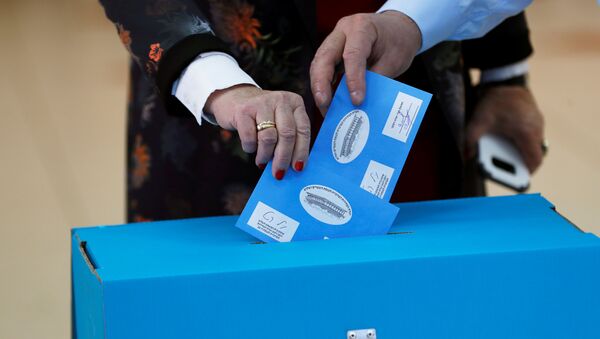The raging Coronavirus, a warning to stay away from crowded places and the fact that this is the third time in less than one year that Israelis are going to the polls didn't keep them at home.
It is still early in Israel, but many have already cast their votes, and it seems that the country is just as divided as it was in the previous rounds.
United behind King Bibi
"I am voting Likud under the leadership of Prime Minister Benjamin Netanyahu as he will protect Israel's borders," said Ronny, a 50-year old from the northern city of Yoqneam.
Touted as Israel's Mr. Security, Netanyahu is known for his hawkish approach to the Palestinian issue and for his efforts to keep the "Iranian threat" at bay.
His achievements on the international arena have also won him a wide range of supporters. The Prime Minister is appreciated for the role he played in the US decision to move its embassy to Jerusalem, the recent peace plan that aimed at resolving the Israeli-Palestinian conflict and for improving Israel's ties with Muslim and Arab nations that have previously been hostile to Israel, including Oman, Chad and Sudan.
Ronny is not alone. According to a poll by Israel's channel 12, Netanyahu's Likud is projected to get 35 seats in the 120-seat Israeli parliament, the Knesset. This is the first time in months that Likud will have bypassed its main rival, the Blue and White party, headed by the former chief of staff, Benny Gantz.
Sergey, a 40-year old from Tel Aviv, has also voted for the premier but unlike Ronny he thinks that Netanyahu is the lesser of the two evils.
"At least you know what to expect from him and we all know how much he has done for the country. I am not ready to try something new and I don't want to put the security and the future of Israel in the hands of a person with next to zero experience," he said, referring to Gantz.
"Plus I feel sorry for Netanyahu and think that he has suffered a lot of injustice."
Following the announcement of Israel's Attorney General Avichai Mandelblitt to indict the prime minister in a series of graft probes that included buying positive press and receiving illegal gifts from a rich donor, thousands took to the streets across Israel venting anger at the decision and expressing their distrust in the country's judiciary system.
A survey conducted by Globes, one of Israel's news websites, has also reiterated the public's dissatisfaction with the system: 44 percent of those asked said their trust in Israel's court's and prosecution office has dropped - partially because of the way the judiciary handled Netanyahu's graft probes.
"What they [the left-wing circles] are doing to him is dirty. I don't understand why they are making so much noise because of some cigars and a couple of champagne bottles," Sergey summed up.
'Sick of Netanyahu's Corruption'
But not everyone agreed. In 2018, 47 percent of Israelis believed that the country's leadership was corrupt. Following indictment charges, the number of those convinced the prime minister was involved in corruption reached 55 percent.
Yafit, a 38-year old from Yoqneam, was one of them. "People are sick of the corruption associated with Bibi but it is not the only reason why I chose Gantz over him. I believe that our leader cannot be a part-time prime minister, splitting his time between premiership and other jobs," she said, referring to a number of ministerial positions he has held before the decision to indict Netanyahu made him drop them.
Now, however, he will also need to split his time between his job as prime minister and defending himself in court.
Netanyahu's trial is expected to kick off on 17 March, just a day after the swearing in of the Knesset, and experts have already warned that the prime minister will be struggling to juggle between his role as head of state and the court hearings.
Voting Left as a Guarantee for Change
However, Netanyahu's legal battles are far from the only reason voters have turned away from the PM. Others are tired of his "racist comments [against Israel's Arabs] and the divisions he has seeded in Israeli society", said Gal, a 26-year-old from Meitar.
"I want the government to respect and care for the weaker population in our society. And this is something that's not happening now," he added.
In 1996, when Netanyahu was elected prime minister for the first time, some 20 percent of Israeli Arabs voted for Likud, but since then the support has dwindled, and now barely passes the five percent mark.
Relations with the Arab community hit a low ebb in the 2015 elections when the prime minister released a video warning voters of high turnout in the Arab sector, sparking criticism from left-wing circles.
Irit, a 58-year old resident of Meitar, has also said she was tired of the "chasms created by the prime minister" and was frustrated from the stagnation in the peace talks with the Palestinians.
"I vote for the left-wing parties [Labour-Gesher-Meretz list] because I identify with the emphasis that the left puts on equality, the resistance to racism and the respect for human dignity. I also support their attempt to resolve the conflict, treating Arabs as equals and having legitimate needs."
Polling stations will close at 20:00 GMT but the country and the world will only know Tuesday morning whether Israel has a winner, or whether its citizens will need to fork out a pretty penny once again to fund a fourth general election.


